人教版九年级全册 Unit 11 Sad movies make me cry. 核心考点讲练课件(共43张PPT)
文档属性
| 名称 | 人教版九年级全册 Unit 11 Sad movies make me cry. 核心考点讲练课件(共43张PPT) |  | |
| 格式 | pptx | ||
| 文件大小 | 2.2MB | ||
| 资源类型 | 教案 | ||
| 版本资源 | 人教新目标(Go for it)版 | ||
| 科目 | 英语 | ||
| 更新时间 | 2022-12-20 14:47:49 | ||
图片预览

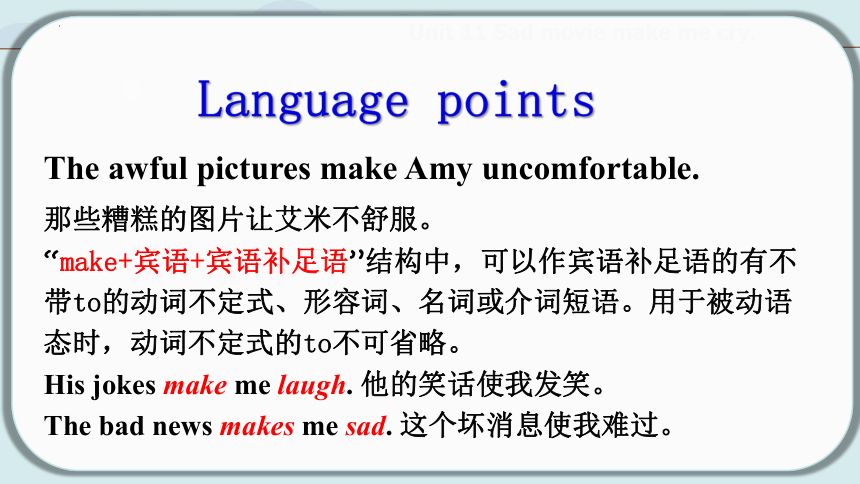
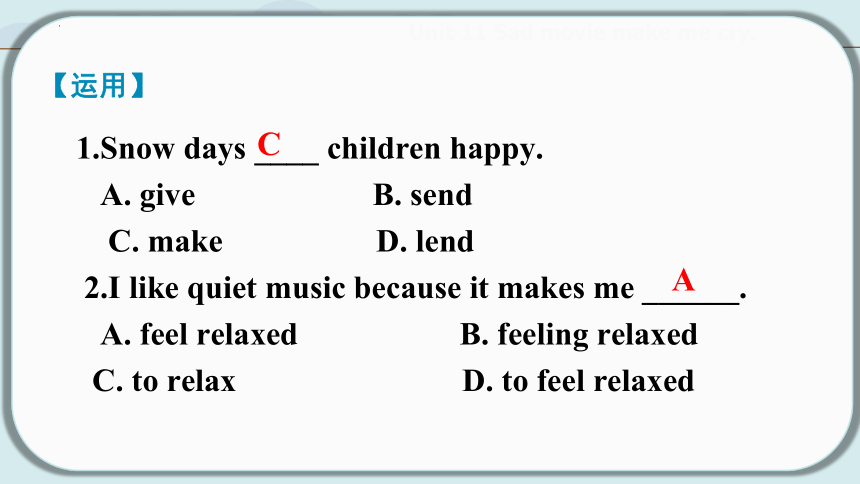
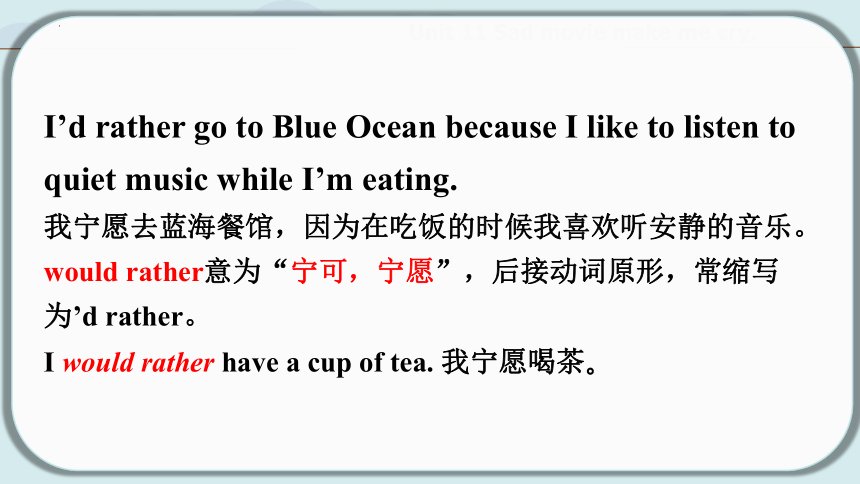
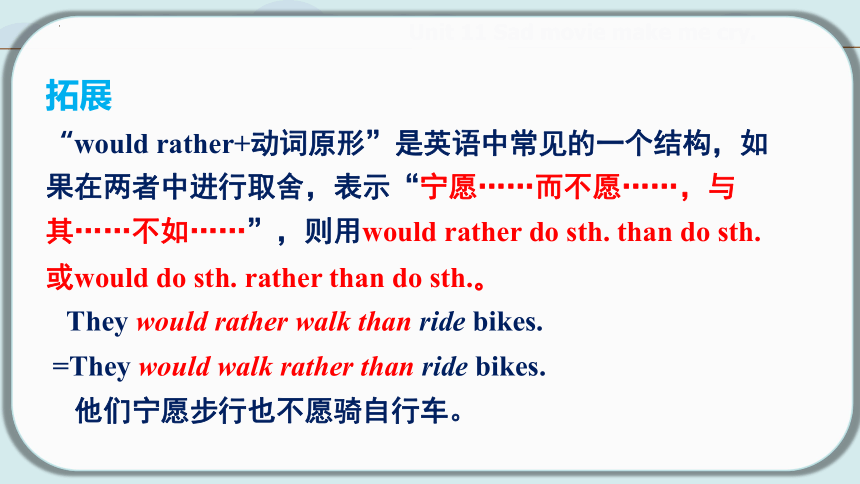
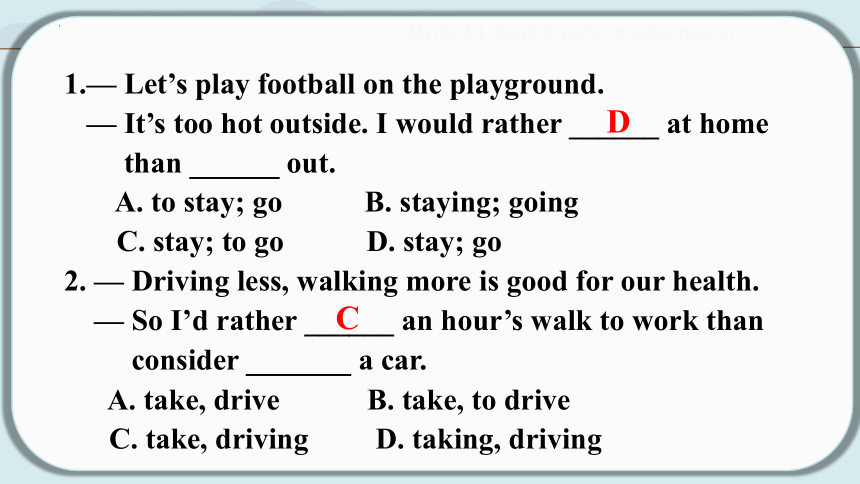
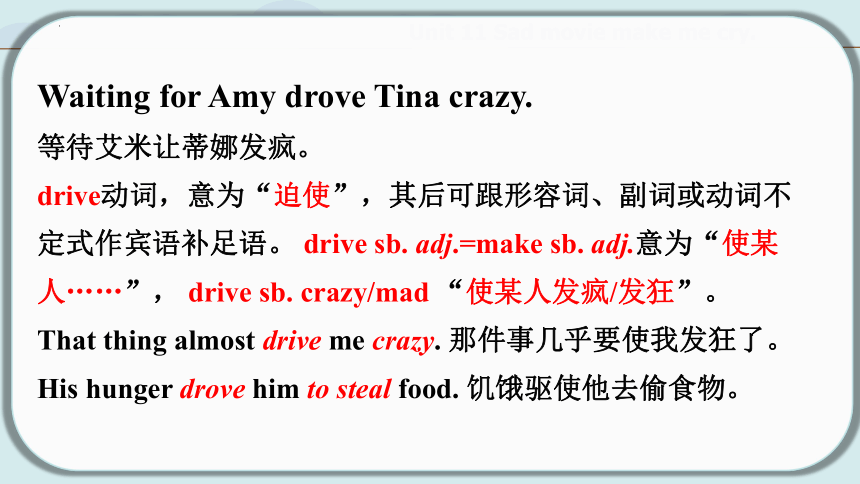
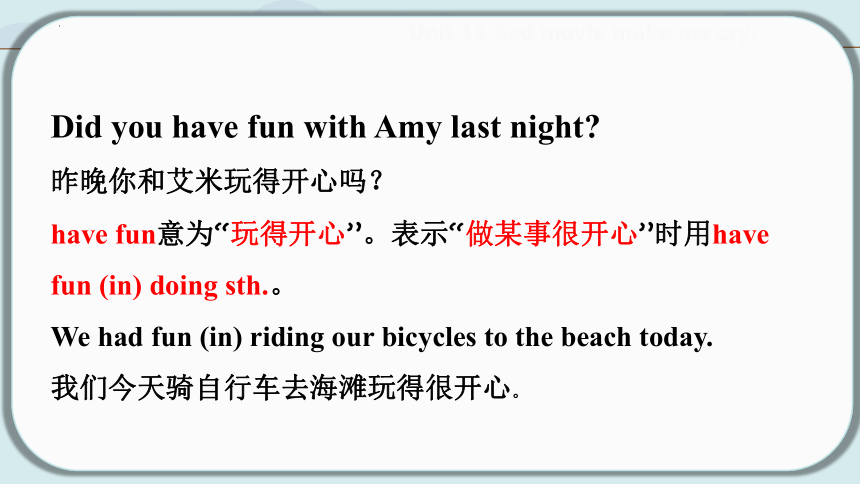
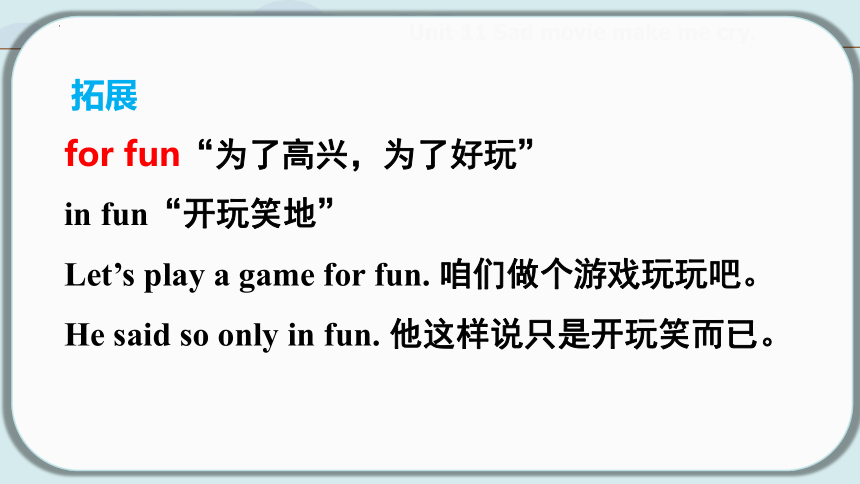
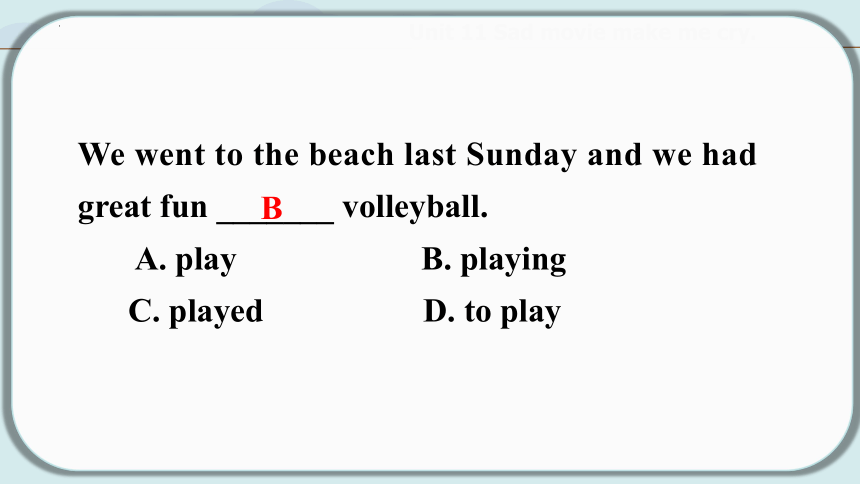
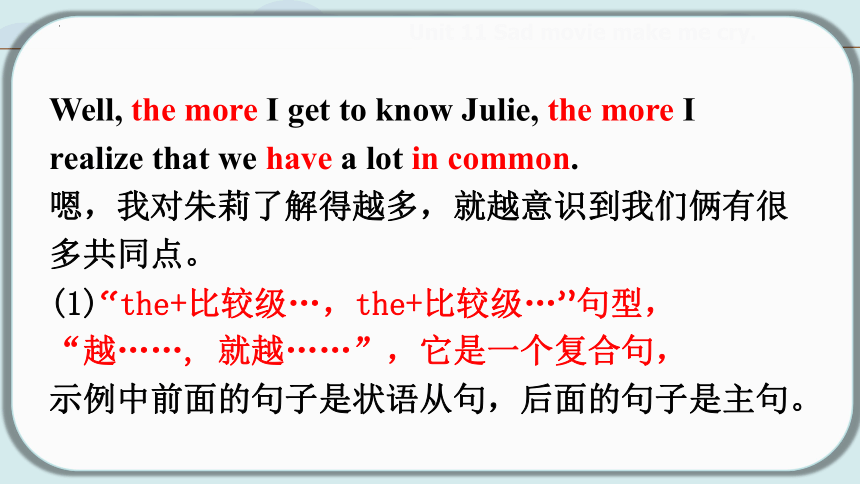
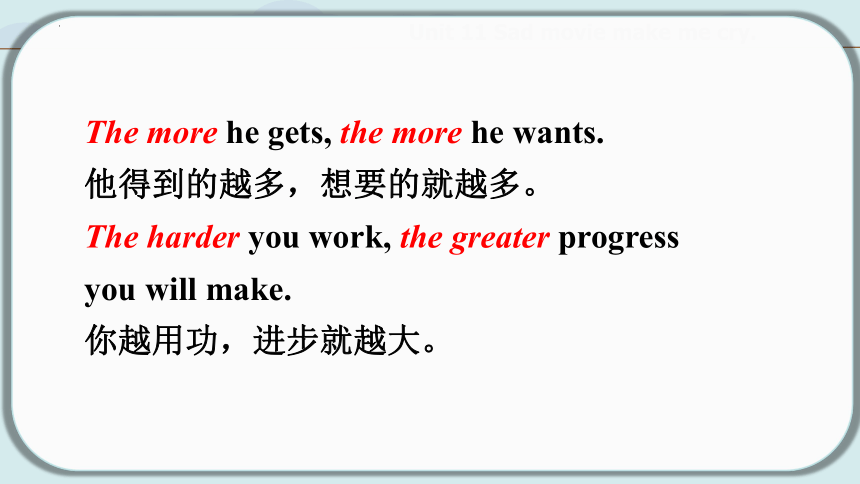
文档简介
(共43张PPT)
人教版 九年级上册
Unit 11 Sad movies made me cry.
核心考点讲练
The awful pictures make Amy uncomfortable.
那些糟糕的图片让艾米不舒服。
“make+宾语+宾语补足语”结构中,可以作宾语补足语的有不带to的动词不定式、形容词、名词或介词短语。用于被动语态时,动词不定式的to不可省略。
His jokes make me laugh. 他的笑话使我发笑。
The bad news makes me sad. 这个坏消息使我难过。
Language points
1.Snow days ____ children happy.
A. give B. send
C. make D. lend
2.I like quiet music because it makes me ______.
A. feel relaxed B. feeling relaxed
C. to relax D. to feel relaxed
C
【运用】
A
I’d rather go to Blue Ocean because I like to listen to quiet music while I’m eating.
我宁愿去蓝海餐馆,因为在吃饭的时候我喜欢听安静的音乐。
would rather意为“宁可,宁愿”,后接动词原形,常缩写为’d rather。
I would rather have a cup of tea. 我宁愿喝茶。
拓展
“would rather+动词原形”是英语中常见的一个结构,如果在两者中进行取舍,表示“宁愿……而不愿……,与其……不如……”,则用would rather do sth. than do sth.或would do sth. rather than do sth.。
They would rather walk than ride bikes.
=They would walk rather than ride bikes.
他们宁愿步行也不愿骑自行车。
1.— Let’s play football on the playground.
— It’s too hot outside. I would rather ______ at home
than ______ out.
A. to stay; go B. staying; going
C. stay; to go D. stay; go
2. — Driving less, walking more is good for our health.
— So I’d rather ______ an hour’s walk to work than
consider _______ a car.
A. take, drive B. take, to drive
C. take, driving D. taking, driving
D
C
Waiting for Amy drove Tina crazy.
等待艾米让蒂娜发疯。
drive动词,意为“迫使”,其后可跟形容词、副词或动词不定式作宾语补足语。 drive sb. adj.=make sb. adj.意为“使某人……”, drive sb. crazy/mad “使某人发疯/发狂”。
That thing almost drive me crazy. 那件事几乎要使我发狂了。
His hunger drove him to steal food. 饥饿驱使他去偷食物。
Did you have fun with Amy last night
昨晚你和艾米玩得开心吗?
have fun意为“玩得开心”。表示“做某事很开心”时用have fun (in) doing sth.。
We had fun (in) riding our bicycles to the beach today.
我们今天骑自行车去海滩玩得很开心。
for fun“为了高兴,为了好玩”
in fun“开玩笑地”
Let’s play a game for fun. 咱们做个游戏玩玩吧。
He said so only in fun. 他这样说只是开玩笑而已。
拓展
We went to the beach last Sunday and we had great fun _______ volleyball.
A. play B. playing
C. played D. to play
B
Well, the more I get to know Julie, the more I realize that we have a lot in common.
嗯,我对朱莉了解得越多,就越意识到我们俩有很多共同点。
(1)“the+比较级…,the+比较级…”句型,
“越……, 就越……”,它是一个复合句,
示例中前面的句子是状语从句,后面的句子是主句。
The more he gets, the more he wants.
他得到的越多,想要的就越多。
The harder you work, the greater progress
you will make.
你越用功,进步就越大。
注意
这种句型的特点是前后都可以有所省略,特别是谚语、俗语,只要意思明确,越简单越好。
The more, the better. 多多益善。
The sooner, the better. 越早越好。
(2) have … in common“有……共同点”
My sister and I have only one thing in common.
我姐姐和我只有一个共同点。
Keep on. Don’t stop. The _________ you climb, the _________ you will see.
A. highest, farthest
B. highly, father
C. high, far
D. higher, farther
D
So we’ve been spending more time together lately. 所以最近我们在一起的时间更多了。
该句使用现在完成进行时,结构为“have/has+been+动词-ing形式”,表示动作从过去某一时间开始,一直延续到现在,并可能还要继续下去。如图所示:
past
now
future
have been doing
现在完成时往往强调动作已经完成,而现在完成进行时通常强调动作仍在持续。
I have cleaned all the windows.
我已经把所有的窗户擦干净了。
I have been cleaning the windows. 我一直在擦窗户。
I have repaired the washing machine.
我已经修好了洗衣机。
I have been repairing the washing machine.
我一直在修洗衣机。
Then she won’t feel left out.
那么她就不会觉得被冷落。
leave out意为“忽略;省略;不包括;不提及”。
No one speaks to him, he always feels left out.
没人跟他讲话,他总是觉得被人冷落。
We can leave out the third sentence.
我们可以删去第三句。
It was so sad that it made us cry.
so… that… 意为“如此……以至于……”, so修
饰形容词或副词,that引导结果状语从句。
(1) so ... that 常用结构
so + adj./adv. + that
(2) such ... that 常用结构
such + a/an + adj. + 可数名词单数 +that ...
such + adj. +可数名词复数/不可数名词 + that ...
Neither medicine nor rest can help him.
药物和休息对他都没有帮助。
neither ... nor ... “既不……也不……”,表示对所
连接并列成分的全部否定。当连接的两个名词或代
词作主语时,句谓语动词在人称和数上要与nor后的
名词或代词保持一致。(就近原则)
Language points
—Tim, how do your parents like pop music
—___ my dad ___ my mom likes it. They both prefer
classical music.
A. Either…or…. B. Neither…nor…
C. Not only…but also… D. Both…and…
【运用】
解析:B Either…or…或者……或者……;neither…nor…既不……也不……;not only…but also…不但……而且……;both...and...两者都。由答语“他们俩更喜欢古典音乐”可推知:他们俩都不喜欢流行音乐。
I’m always worried about losing my power. Many
people are trying to take my position.
我总在担心失去我的权力。 很多人都想要取代我
的位置。
1) be worried about =worry about 担心
We are all worried about my grandpa’s health.
我们总是担心我爷爷的健康。
2) take one’s position 取代某人的位置
同义词组:take one’s place
e.g. He takes my position/place.
他取代了我的位置。
be followed by 被跟随
I’m always worried about being followed
by others.
我总是担心被人跟随。
find a happy man in three days’ time.
in three days’ time 3天的时间
in+时间段 在一段时间内,用于将来时。
我三天之内回来。
I will be back in three days.
Language points
make的使役用法
make作为使役动词,意为“使;使成为”。在表示“使(要)某人(事物)做什么(怎么样)”时,它除了要有一个“宾语”之外,还要求宾语后面带上一个宾语补足语,整个句子才能完整,其用法有:
1.“make+名词/代词+形容词(短语)”意为“使某人/某物(感到)……”。make是谓语动词,名词/代词是make的宾语,后面的形容词或形容词短语在此作宾语补足语。
Drinking coffee can make me energetic.
喝咖啡能使我活力充沛。
2.“make+名词/代词+动词原形”意为“使某人做某事”,此处的动词原形是省略to的不定式,也作宾补。
Nobody made us go to bed at a certain time.
没有人让我们在某一固定时间就寝。
像这样的词常见的有:听(hear)、观(see, watch, notice)、感(feel)、使(make)、让(let, have)、助(help)等。
【归纳拓展】
make只能跟动词不定式(省略to)作宾补,但不能跟现在分词作宾补。但是有些动词,如see, find, watch, notice, hear等,它们既可以接不带to的不定式作宾
补,表示已经完成。也可以接现在分词作宾补,表示动作正在进行或发生。
I heard him singing in the classroom.
我听到他在教室里唱歌。
(“唱”这个动作正在进行)
3.“make+名词/代词+名词(短语)”意为“使某人/某物(变得)……”,名词(短语)作宾补。We made him our monitor.
我们选他当我们的班长。
4.“make+宾语+过去分词”意为“使某人/某事被……”。宾语补足语是过去分词时,
宾语是过去分词的逻辑宾语,宾语与过去分词之间存在逻辑上的被动关系。
We must make it done in two hours.
我们必须 在两个小时内做完这件事。
The general cannot find a happy person and the king remains unhappy forever.
general 在此作名词,意为“将军;上将”。
The general designated an officer to the command.
该将军任命一名军官担任指挥官。
They dismounted the general by stealing his horse.
他们盗走将军的马匹使他丧失坐骑。
Language points
general 还可作形容词,意为“一般的,普通的;综合的;大体的”
It concerns me because of the safety of my friends, general citizens, and my folks back home.
我关心这个问题,这是因为它关系到我的家人、朋友和普通公民的安全。
I mean, in a general sense, I think, no, they should not.
我的意思是,在一般意义上来说,我认为,不会,他们不应该会。
The general finds a happy person with power, money and fame.
with 表伴随,“带着……,与…… 一起,随
着,有”;反义词:without“没有”。后面
均可接名词或动名词。
e.g. He left without saying a word.
他一句话都没有说就走了。
Language points
How could he have missed scoring that goal
could have done 表示“过去本能够做某事但未做”,包含“责备”意义。如:
How could he have been such a fool
他怎么这么糊涂?
How could she have forgotten what kind of man
he was 她怎么能忘记他是哪种人呢?
But whatever it was, don’t be too hard on yourself.
be hard on sb. 过于严格地要求某人;对某人过
于严厉;以刻薄的方式批评、对待某人
e.g. Some teachers today are too hard on their
students.
如今一些老师对学生的要求过于严厉。
Besides, wining or losing is only half the game.
besides“除……以外还有”,表示包括后面提
到的人或物在内
except“除去”,表示不包括后面所提到的人
或物在内,如:
All the students went to the park except Jim. (Jim没去)
Lucy went to the cinema besides Lily. (Lily也去了)
besides “除此之外,还包括”,指在整体中加入一部分,表示一种累加关系,有“加上”之意。
except “除…….之外”(不包括后者在内),着重强调在同类人或物中除去一个或几个人或物,表示一种排除关系,有“减除”之意。
but “除了”,与except用法基本相同,但着重强调整句的内容,常修饰否定意义的代词或疑问代词。
besides,except & but
—What language do you also speak ________
English
— French. But just a little.
A. besides B. except
C. beside D. among
A
He had let his whole team down.
他让整个团队失望了。
let sb. down (to fail to help or support sb. as they
had expected or hoped) 意为“不能帮助;不能支
持(某人);使失望”。如:
I’m afraid she let us down badly.
很遗憾,她让我们很失望。
1.保罗获得了一等奖,没有让我们失望。
Paul won the first prize and didn’t
______________.
2. Linda tries her best to get good grades at
school in order not to her parents .
A. let; down B. remind; of
C. call; up D. wake; up
let us down
A
He was really worried that his coach may kick
him off the team. 他很担心教练会把他踢出球队。
kick sb. off sth. 意为“使某人离开;开除;逐出”
相当于kick sb. out of sth. 如:
You will be kicked off the club if you break the rule again.
如果你再违反规定的话,你将被逐出这个俱乐部。
To his surprise and relief, his teammates all
nodded in agreement.
令他惊讶和欣慰的是,他的队友全都赞同地点头。
“to +one’s+情感名词”是英语中一个十分常见的结构,主要表示某人由于某事的发生而唤起其内心的某种情感,通常译为“令某人……的是;使某人感到……的是”。
人教版 九年级上册
Unit 11 Sad movies made me cry.
核心考点讲练
The awful pictures make Amy uncomfortable.
那些糟糕的图片让艾米不舒服。
“make+宾语+宾语补足语”结构中,可以作宾语补足语的有不带to的动词不定式、形容词、名词或介词短语。用于被动语态时,动词不定式的to不可省略。
His jokes make me laugh. 他的笑话使我发笑。
The bad news makes me sad. 这个坏消息使我难过。
Language points
1.Snow days ____ children happy.
A. give B. send
C. make D. lend
2.I like quiet music because it makes me ______.
A. feel relaxed B. feeling relaxed
C. to relax D. to feel relaxed
C
【运用】
A
I’d rather go to Blue Ocean because I like to listen to quiet music while I’m eating.
我宁愿去蓝海餐馆,因为在吃饭的时候我喜欢听安静的音乐。
would rather意为“宁可,宁愿”,后接动词原形,常缩写为’d rather。
I would rather have a cup of tea. 我宁愿喝茶。
拓展
“would rather+动词原形”是英语中常见的一个结构,如果在两者中进行取舍,表示“宁愿……而不愿……,与其……不如……”,则用would rather do sth. than do sth.或would do sth. rather than do sth.。
They would rather walk than ride bikes.
=They would walk rather than ride bikes.
他们宁愿步行也不愿骑自行车。
1.— Let’s play football on the playground.
— It’s too hot outside. I would rather ______ at home
than ______ out.
A. to stay; go B. staying; going
C. stay; to go D. stay; go
2. — Driving less, walking more is good for our health.
— So I’d rather ______ an hour’s walk to work than
consider _______ a car.
A. take, drive B. take, to drive
C. take, driving D. taking, driving
D
C
Waiting for Amy drove Tina crazy.
等待艾米让蒂娜发疯。
drive动词,意为“迫使”,其后可跟形容词、副词或动词不定式作宾语补足语。 drive sb. adj.=make sb. adj.意为“使某人……”, drive sb. crazy/mad “使某人发疯/发狂”。
That thing almost drive me crazy. 那件事几乎要使我发狂了。
His hunger drove him to steal food. 饥饿驱使他去偷食物。
Did you have fun with Amy last night
昨晚你和艾米玩得开心吗?
have fun意为“玩得开心”。表示“做某事很开心”时用have fun (in) doing sth.。
We had fun (in) riding our bicycles to the beach today.
我们今天骑自行车去海滩玩得很开心。
for fun“为了高兴,为了好玩”
in fun“开玩笑地”
Let’s play a game for fun. 咱们做个游戏玩玩吧。
He said so only in fun. 他这样说只是开玩笑而已。
拓展
We went to the beach last Sunday and we had great fun _______ volleyball.
A. play B. playing
C. played D. to play
B
Well, the more I get to know Julie, the more I realize that we have a lot in common.
嗯,我对朱莉了解得越多,就越意识到我们俩有很多共同点。
(1)“the+比较级…,the+比较级…”句型,
“越……, 就越……”,它是一个复合句,
示例中前面的句子是状语从句,后面的句子是主句。
The more he gets, the more he wants.
他得到的越多,想要的就越多。
The harder you work, the greater progress
you will make.
你越用功,进步就越大。
注意
这种句型的特点是前后都可以有所省略,特别是谚语、俗语,只要意思明确,越简单越好。
The more, the better. 多多益善。
The sooner, the better. 越早越好。
(2) have … in common“有……共同点”
My sister and I have only one thing in common.
我姐姐和我只有一个共同点。
Keep on. Don’t stop. The _________ you climb, the _________ you will see.
A. highest, farthest
B. highly, father
C. high, far
D. higher, farther
D
So we’ve been spending more time together lately. 所以最近我们在一起的时间更多了。
该句使用现在完成进行时,结构为“have/has+been+动词-ing形式”,表示动作从过去某一时间开始,一直延续到现在,并可能还要继续下去。如图所示:
past
now
future
have been doing
现在完成时往往强调动作已经完成,而现在完成进行时通常强调动作仍在持续。
I have cleaned all the windows.
我已经把所有的窗户擦干净了。
I have been cleaning the windows. 我一直在擦窗户。
I have repaired the washing machine.
我已经修好了洗衣机。
I have been repairing the washing machine.
我一直在修洗衣机。
Then she won’t feel left out.
那么她就不会觉得被冷落。
leave out意为“忽略;省略;不包括;不提及”。
No one speaks to him, he always feels left out.
没人跟他讲话,他总是觉得被人冷落。
We can leave out the third sentence.
我们可以删去第三句。
It was so sad that it made us cry.
so… that… 意为“如此……以至于……”, so修
饰形容词或副词,that引导结果状语从句。
(1) so ... that 常用结构
so + adj./adv. + that
(2) such ... that 常用结构
such + a/an + adj. + 可数名词单数 +that ...
such + adj. +可数名词复数/不可数名词 + that ...
Neither medicine nor rest can help him.
药物和休息对他都没有帮助。
neither ... nor ... “既不……也不……”,表示对所
连接并列成分的全部否定。当连接的两个名词或代
词作主语时,句谓语动词在人称和数上要与nor后的
名词或代词保持一致。(就近原则)
Language points
—Tim, how do your parents like pop music
—___ my dad ___ my mom likes it. They both prefer
classical music.
A. Either…or…. B. Neither…nor…
C. Not only…but also… D. Both…and…
【运用】
解析:B Either…or…或者……或者……;neither…nor…既不……也不……;not only…but also…不但……而且……;both...and...两者都。由答语“他们俩更喜欢古典音乐”可推知:他们俩都不喜欢流行音乐。
I’m always worried about losing my power. Many
people are trying to take my position.
我总在担心失去我的权力。 很多人都想要取代我
的位置。
1) be worried about =worry about 担心
We are all worried about my grandpa’s health.
我们总是担心我爷爷的健康。
2) take one’s position 取代某人的位置
同义词组:take one’s place
e.g. He takes my position/place.
他取代了我的位置。
be followed by 被跟随
I’m always worried about being followed
by others.
我总是担心被人跟随。
find a happy man in three days’ time.
in three days’ time 3天的时间
in+时间段 在一段时间内,用于将来时。
我三天之内回来。
I will be back in three days.
Language points
make的使役用法
make作为使役动词,意为“使;使成为”。在表示“使(要)某人(事物)做什么(怎么样)”时,它除了要有一个“宾语”之外,还要求宾语后面带上一个宾语补足语,整个句子才能完整,其用法有:
1.“make+名词/代词+形容词(短语)”意为“使某人/某物(感到)……”。make是谓语动词,名词/代词是make的宾语,后面的形容词或形容词短语在此作宾语补足语。
Drinking coffee can make me energetic.
喝咖啡能使我活力充沛。
2.“make+名词/代词+动词原形”意为“使某人做某事”,此处的动词原形是省略to的不定式,也作宾补。
Nobody made us go to bed at a certain time.
没有人让我们在某一固定时间就寝。
像这样的词常见的有:听(hear)、观(see, watch, notice)、感(feel)、使(make)、让(let, have)、助(help)等。
【归纳拓展】
make只能跟动词不定式(省略to)作宾补,但不能跟现在分词作宾补。但是有些动词,如see, find, watch, notice, hear等,它们既可以接不带to的不定式作宾
补,表示已经完成。也可以接现在分词作宾补,表示动作正在进行或发生。
I heard him singing in the classroom.
我听到他在教室里唱歌。
(“唱”这个动作正在进行)
3.“make+名词/代词+名词(短语)”意为“使某人/某物(变得)……”,名词(短语)作宾补。We made him our monitor.
我们选他当我们的班长。
4.“make+宾语+过去分词”意为“使某人/某事被……”。宾语补足语是过去分词时,
宾语是过去分词的逻辑宾语,宾语与过去分词之间存在逻辑上的被动关系。
We must make it done in two hours.
我们必须 在两个小时内做完这件事。
The general cannot find a happy person and the king remains unhappy forever.
general 在此作名词,意为“将军;上将”。
The general designated an officer to the command.
该将军任命一名军官担任指挥官。
They dismounted the general by stealing his horse.
他们盗走将军的马匹使他丧失坐骑。
Language points
general 还可作形容词,意为“一般的,普通的;综合的;大体的”
It concerns me because of the safety of my friends, general citizens, and my folks back home.
我关心这个问题,这是因为它关系到我的家人、朋友和普通公民的安全。
I mean, in a general sense, I think, no, they should not.
我的意思是,在一般意义上来说,我认为,不会,他们不应该会。
The general finds a happy person with power, money and fame.
with 表伴随,“带着……,与…… 一起,随
着,有”;反义词:without“没有”。后面
均可接名词或动名词。
e.g. He left without saying a word.
他一句话都没有说就走了。
Language points
How could he have missed scoring that goal
could have done 表示“过去本能够做某事但未做”,包含“责备”意义。如:
How could he have been such a fool
他怎么这么糊涂?
How could she have forgotten what kind of man
he was 她怎么能忘记他是哪种人呢?
But whatever it was, don’t be too hard on yourself.
be hard on sb. 过于严格地要求某人;对某人过
于严厉;以刻薄的方式批评、对待某人
e.g. Some teachers today are too hard on their
students.
如今一些老师对学生的要求过于严厉。
Besides, wining or losing is only half the game.
besides“除……以外还有”,表示包括后面提
到的人或物在内
except“除去”,表示不包括后面所提到的人
或物在内,如:
All the students went to the park except Jim. (Jim没去)
Lucy went to the cinema besides Lily. (Lily也去了)
besides “除此之外,还包括”,指在整体中加入一部分,表示一种累加关系,有“加上”之意。
except “除…….之外”(不包括后者在内),着重强调在同类人或物中除去一个或几个人或物,表示一种排除关系,有“减除”之意。
but “除了”,与except用法基本相同,但着重强调整句的内容,常修饰否定意义的代词或疑问代词。
besides,except & but
—What language do you also speak ________
English
— French. But just a little.
A. besides B. except
C. beside D. among
A
He had let his whole team down.
他让整个团队失望了。
let sb. down (to fail to help or support sb. as they
had expected or hoped) 意为“不能帮助;不能支
持(某人);使失望”。如:
I’m afraid she let us down badly.
很遗憾,她让我们很失望。
1.保罗获得了一等奖,没有让我们失望。
Paul won the first prize and didn’t
______________.
2. Linda tries her best to get good grades at
school in order not to her parents .
A. let; down B. remind; of
C. call; up D. wake; up
let us down
A
He was really worried that his coach may kick
him off the team. 他很担心教练会把他踢出球队。
kick sb. off sth. 意为“使某人离开;开除;逐出”
相当于kick sb. out of sth. 如:
You will be kicked off the club if you break the rule again.
如果你再违反规定的话,你将被逐出这个俱乐部。
To his surprise and relief, his teammates all
nodded in agreement.
令他惊讶和欣慰的是,他的队友全都赞同地点头。
“to +one’s+情感名词”是英语中一个十分常见的结构,主要表示某人由于某事的发生而唤起其内心的某种情感,通常译为“令某人……的是;使某人感到……的是”。
同课章节目录
- Unit 1 How can we become good learners.
- Section A
- Section B
- Unit 2 I think that mooncakes are delicious!
- Section A
- Section B
- Unit 3 Could you please tell me where the restroom
- Section A
- Section B
- Unit 4 I used to be afraid of the dark.
- Section A
- Section B
- Unit 5 What are the shirts made of?
- Section A
- Section B
- Review of Units 1-5
- Unit 6 When was it invented?
- Section A
- Section B
- Unit 7 Teenagers should be allowed to choose their
- Section A
- Section B
- Unit 8 It must belong to Carla.
- Section A
- Section B
- Unit 9 I like music that I can dance to.
- Section A
- Section B
- Unit 10 You're supposed to shake hands.
- Section A
- Section B
- Review of Units 6-10
- Unit 11 Sad movies make me cry.
- Section A
- Section B
- Unit 12 Life is full of the unexpected
- Section A
- Section B
- Unit 13 We're trying to save the earth!
- Section A
- Section B
- Unit 14 I remember meeting all of you in Grade 7.
- Section A
- Section B
- Review of Units 11-14
